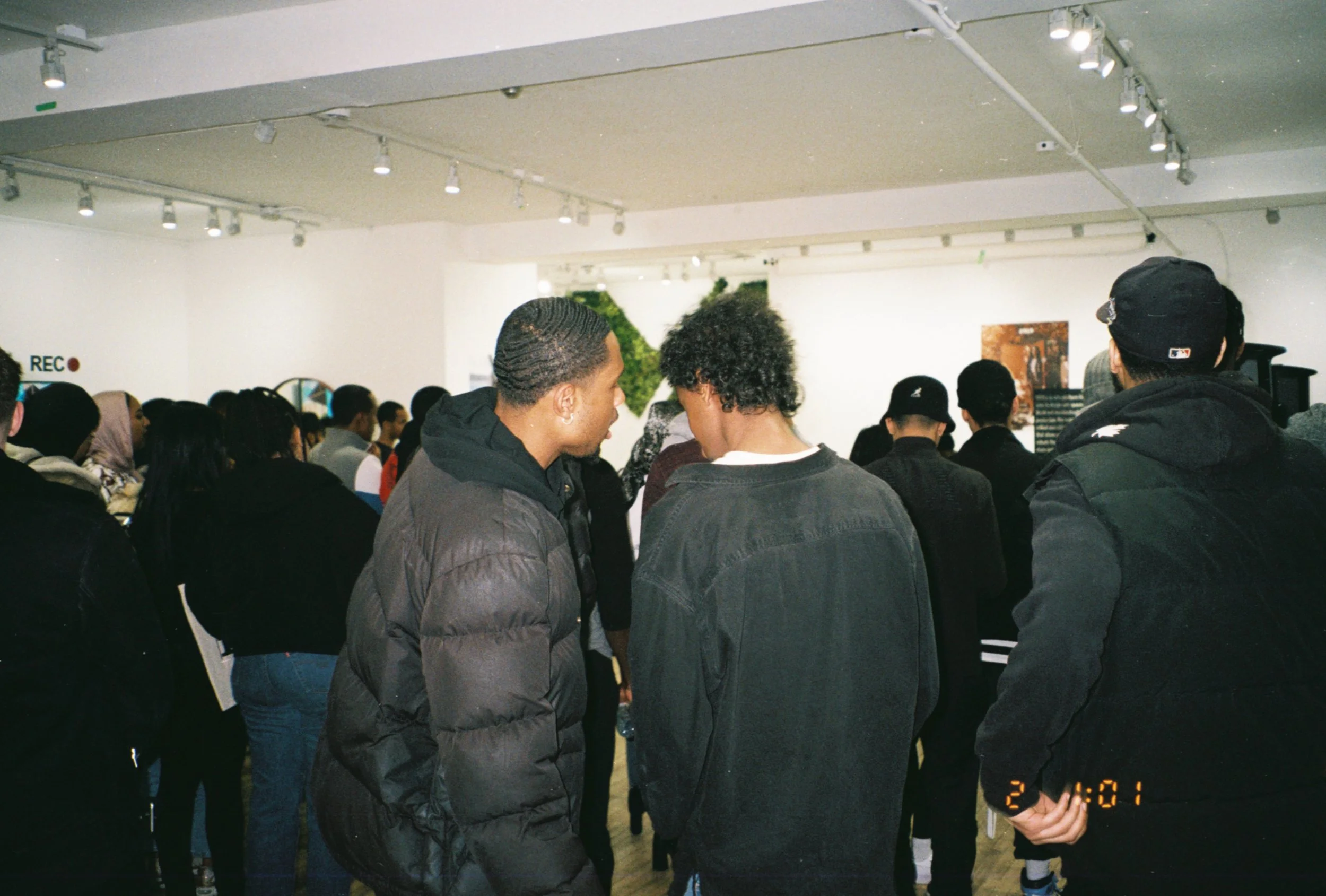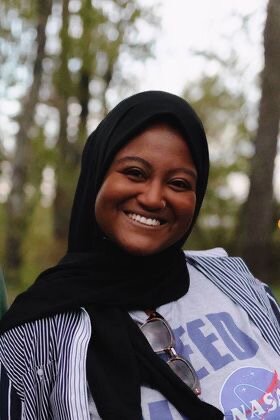Uma Samari
Inspired by historical events, movements, activists, and organizers, as well as our upcoming fifth issue, free dreams, this Archival of the Black Radical Tradition, seeks to consolidate and honour Black cultural workers around Canada who commit their art, creativity, and labour to honouring Black historicism and its subsequent impact on social and cultural tradition.
“I believe there is a reason that He [God] has made me a Black person. I’d like to believe it is because He loves me the most.” – Uma Samari, 2020
Uma Samari was 12 years old when the weight of the world revealed itself to her. A friend had confided in her a uniquely difficult experience which led her to learn about the volatility (and hidden beauty) of being a deeply feeling person – a self-proclaimed emo if you ask Uma. This all too common challenge birthed in her a poetic future. She explains “I became a poet accidently... poetry lends itself nicely to frazzled thoughts and disarray.” Uma’s poetry was not born out of boredom, virality, nor training. Rather, her journey to poetry was, as she explains, one of survival.
Less, poet is but one of her titles: a published author of two books (Ina Kwana, 2016; Black, 2017), a master’s student in Educational Leadership, and teacher of a kindergarten classroom mark her expanding capacity as a storyteller and cultural worker.
While her journey to poetry was impacted by hardship and tribulation, her journey to authorship was guided by her mother. She attests that “it was never my dream to write a book.” Much like the onset of her poetry, at the age of 21, she found herself trying to make sense of life and bled pen to paper. With her mother’s guidance, Ina Kwana came to materialize.
Most definitely, Uma’s path to authorship speaks to our ancestors, elders, and community’s ability to reveal to us our talents, our gifts, our capacities – our dreams! This assemblage of actors are able to convey who we are and what is meant for us – all there is to do is listen, for our ancestors communicate to us through those closest.
“I never set out to build a movement and I don’t think I have built a movement. I think I am naturally apart of it because of my identity, because of how I was born. I was born Black, I was raised Black, and I love and live as a Black person.” – Uma Samari, 2020
Uma explains that her role in this larger movement (of Black empowerment, Black Lives Matter, or the organizing we are currently bearing witness to more generally) is unintentional. She explains “I am part of the movement because I am the movement. As a Black person, you are the movement.”
It is clear that Uma’s faith leads her in her organizing and in her resilience. “I am a Muslim, and I believe strongly in God and what he has ordained. I believe there is a reason that He has made me a Black person. I’d like to believe it is because He loves me the most. But it could also be because the kind of soul that He has given me is a soul that can bear witness to this world and can be a part of it and feel the weight of it, without it destroying me.”
In speaking with Uma – we bonded as Black women. We shared stories of struggle navigating, not only the sharp edges of this society we live in, but also the tribulations of being a young Black woman. She counselled, offering that “it is very hard to set out to be understood. As a Black person, I have tried to make people understand what it’s like to be living in this world and be a Muslim, be Black, and be a woman. And they just don’t understand… why should I try and make you understand? This is a fact. I am me. My experiences are fact.” It was clear to me, in speaking with Uma, that her tongue carries the ability to heal, to love, and to speak truth to power.
“If you know any Black people, bring them to me, take me to them, I need to find my people.”
Canadian born to a Ghanaian father and Belizean mother, Uma was hungry to understand her community. “The communal spaces that I occupy are more Muslim than anything else. Many of my friends are not Black Muslims, although I do have Black Muslim friends. Although they are lovely people – it’s still a lonely experience because like I said, there is a kinship that exists between Black people. I see them creating bonds with one another and I really crave that. So, one of the things I am about to do is to find out more about my people, so I went to Ghana in 2015 with my father, and I went to Belize where my mom is from.”
“Going to Ghana…in 2015, it felt like Ghana raised me. [It was like] going to a place that was home, though it wasn’t home, though it was home.”
Of her 2015 trip to Ghana, Uma detailed her evolving consciousness and understanding of her community following a visit to a historical slave camp. “The anger and generational trauma became evident and clear to me because it allowed me to understand that people were literally snatched from streets, people were literally tied to rocks under the hottest sun and left there for hours on end and would die of heat exhaustion. Of course, they were angry. Of course, they are going to talk about it and talk about it and talk about it. And that anger carries itself through the bloodline, through the generations. Of course, Black people are angry. Of course, African American’s, in particular, are angry. Because our ancestors have witnessed what has happened to them and their people.”
Uma Samari, Photograph
While Ghana revealed to Uma, a home away from home, she emphasizes, with all of the emotions and depth a poet and artist could possess, what it has done to her. “Going to Ghana has made me angry. Because I sat there, and I listened, and I wanted to burn the whole world down. But I also wanted to build it at the same time.”
When asking Uma of her dreams and capacity to dream freely, she hesitates. Understandably, as a person often met with opposition, it becomes quite difficult to dream freely. Difficult to the point where some people might say its improbable or impossible. “I think dreaming freely is one of the first things that is met with opposition. Once you are able to move past that first hurdle, and then the second, and then the third, and then the fourth, you are capable of dreaming freely.”
“I’m having a hard time having a dream for myself. So, dreaming for the world becomes almost impractical – I have to learn how to dream for myself first.”
If individuals dreamt freely for their own personal realization, then doing so as a collective, likely becomes reflexive – instinctual even. In many ways, to dream for yourself and to fulfill those dreams inherently enables your community to do so as well.
Unfortunately, for many Black, Indigenous, or racialized people, it hardly ends there. Uma details her life as a daughter of immigrants and the all too familiar account of immigrant parents sacrificing their dreams for yours. Ironically, what stops Uma, and many like her, from dreaming freely, is her responsibility to care for her parents – and in many ways, this has meant putting her life on hold so that she can be closer to them, care for them, protect them. Uma explains, “it’s sometimes found in the decision between going to school elsewhere and staying at home because your parents ask you to. It is choosing to stay at home rather than going out with your friends because your parents ask you to and sometimes your parents ask you to sacrifice a dream. And you do it. Because your parents ask you to.”
Hardly controlling, the dutiful protections of our parents and caretakers contributes to a cycle of first- and second-generation people sacrificing dreams to fulfill the aspirations of the other – ironically mirroring the sacrificial practice that paved the way before them.
Uma’s vision for the future is revealing, “we can only hope that our children actually get to live a dream selfishly. That would be my greatest pleasure, to have my children live a dream selfishly, but to have that selfish dream [benefit] the wider community.” When thinking of what that might look like, she pauses and hesitates, ultimately stating “I am not there. I do not belong to the generation of selfish dreamers. I belong to the generation of dreamers that dream for their parents.”
Uma attributes her passion and artistry to the cultural workers who laid the groundwork for her. “Everything that I am is because I am the product of the thinkers, the dreamers, the workers, the practitioners that came before me. So very essentially, I am a product of them, I am their student. I think it is so important to know the history of your field, because there comes a time where you will look for inspiration so you can carry on and do more than what you have seen done, and when you get to that point it is nice to know that you are not alone, that you can roam, or you can walk or run, or live with giants because maybe one day you will become one of them.”
When asked about her future plans, she sighs gently: “hell, highwater, or just peace…I am okay with it all.” And with the gentleness and vocabulary of a true poet, she reminds me, “it feels like God loves us so much to make us Black women, and to come into contact with you is evidence of that, evidence of His love, and evidence that there is care in community. Though we have met once, it still feels like there is kinship.” And with her word, I am awakened to Uma the woman – a woman who extends beyond her poetry, beyond her classroom, and beyond her publications. I am met face to face with a woman dedicated to her Blackness, her faith, and, most definitely, herself.





